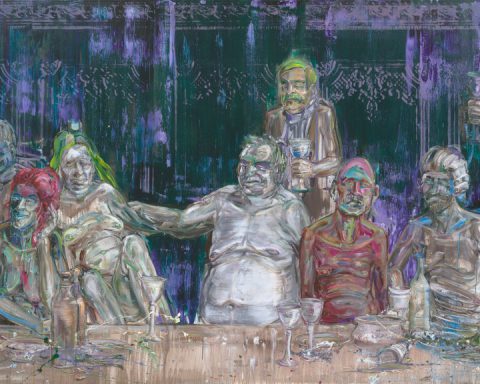The literary importance of C. P. Cavafy lies not only in his knowledge of so many subjects and in the large number of his poems, prose pieces and translations. Through short, precise verses, with very few words, he could create an entire world and wisely ask the reader some important questions.
“And if you can’t shape your life the way you want…”
He was never awarded a Nobel Prize in Literature, but the institution was relatively fresh during his time, and his work not as well-known back then as it is today. Two other Greek poets, George Seferis and Odysseus Elytis, got the Nobel in the 60s and in the late 70s, respectively.

Cavafy has been compared to Fernando Pessoa, although his subjects and his style have nothing in common with the famous Portuguese poet’s. Or do they?
They both are lighthouses shining upon the world, standing alone, standing apart.
The lighthouse of Lisbon went out in 1935. Cavafy, the lighthouse of Alexandria, had faded two years before, in 1933.
In Greece, where I come from, he is a household name. There are at least three of his poems that people use so extensively that it makes them lose all their power of symbolism, becoming commonplace quotations.
Cavafy lived in Alexandria, Egypt, a member of the large Greek community in the city, and wrote his poetry in a slightly idiomatic language. His preferred themes were the history of the Hellenistic era and some lesser known incidents of that time, as well as his homosexuality, which was a source of trouble and guilt for him all his life. These were still very conservative times, and the poet would only hint at it in the poems he published, describing it mostly as a sin and a burden.
The poet was a familiar name in our household, as my own grandfather had met this legendary figure in person. My own poems, I admit, are greatly influenced by Cavafy’s philosophy.
Those who have read The Alexandria Quartet by L. Durrell surely know who Cavafy was.

There is much to be admired in his poetry, but I’m not sure how his characteristic style can be translated into other languages. Yet, it is not so much the music of the verses that is so important; mostly it is the ideas, the atmosphere of his historical and mythological poems.
A parade of personalities such as Cleopatra and Ulysses come alive before our eyes, as do the first Christians and the Byzantine kings and their moral dilemmas.

Cavafy’s Ithaca is his best-known poem, resonating with the idea that what matters in our life is not the arrival at a place but the journey itself, with all the experiences we have gathered along the way. He was probably the first author of modern times to come up with this concept.
His heroic Thermopylae talks about high values and sacrifice, whereas his poem Waiting for the Barbarians is an allegory about certainty, anxiety, the cancellation of plans.
His erotic poems reflect his agony to buy love once more in the tavernas and the brothels of the city where young boys are selling their body. These poems belong to another category, but they are not lesser than the first ones.

The dark basements, the seedy bars, the bodies in the act of love, but also the feelings for some of them, or the need to be loved and desired and remembered… all this by a respectable member of society, by a cultivated man who worked as a clerk at the Ministry of Public Works.
If you still haven’t had the chance to encounter Cavafy during your literary adventures, maybe you will be happy to let this lighthouse of Alexandria guide you through centuries of Greek history.
As, for example, in the beautiful Of Colored Glass:
I am very moved by one detail
in the coronation at Vlachernai of John Kantakuzinos
and Irini, daughter of Andronikos Asan.
Because they had only a few precious stones
(our afflicted empire was extremely poor)
they wore artificial ones: numerous pieces of glass,
red, green, or blue. I find
nothing humiliating or undignified
in those little pieces of colored glass.
On the contrary, they seem
a sad protest against
the unjust misfortune of the couple being crowned,
symbols of what they deserved to have,
of what surely it was right that they should have
at their coronation — a Lord John Kantakuzinos,
a Lady Irini, daughter of Andronikos Asan.

You will let him introduce you to his subtle irony and his moral criticism in Alexandrian Kings:
The Alexandrians turned out in force
to see Cleopatra’s children,
Kaisarion and his little brothers,
Alexander and Ptolemy, who for the first time
had been taken out to the Gymnasium,
to be proclaimed kings there
before a brilliant array of soldiers.
Alexander: they declared him
king of Armenia, Media, and the Parthians.
Ptolemy: they declared him
king of Cilicia, Syria, and Phoenicia.
Kaisarion was standing in front of the others,
dressed in pink silk,
on his chest a bunch of hyacinths,
his belt a double row of amethysts and sapphires,
his shoes tied with white ribbons
prinked with rose-colored pearls.
They declared him greater than his little brothers,
they declared him King of Kings.
The Alexandrians knew of course
that this was all mere words, all theatre.
But the day was warm and poetic,
the sky a pale blue,
the Alexandrian Gymnasium
a complete artistic triumph,
the courtiers wonderfully sumptuous,
Kaisarion all grace and beauty
(Cleopatra’s son, blood of the Lagids);
and the Alexandrians thronged to the festival
full of enthusiasm, and shouted acclamations
in Greek, and Egyptian, and some in Hebrew,
charmed by the lovely spectacle —
though they knew of course what all this was worth,
what empty words they really were, these kingships.
Finally, you will want to Come Back to Cavafy’s poetry and discover the might of his feelings.
Come back often and take hold of me,
sensation that I love come back and take hold of me —
when the body’s memory awakens
and an old longing again moves into the blood,
when lips and skin remember
and hands feel as though they touch again.
Come back often, take hold of me in the night
when lips and skin remember…











